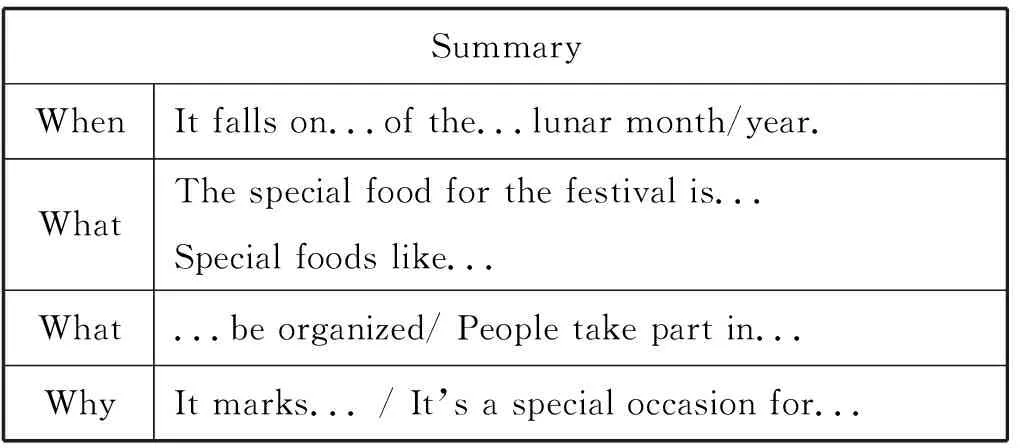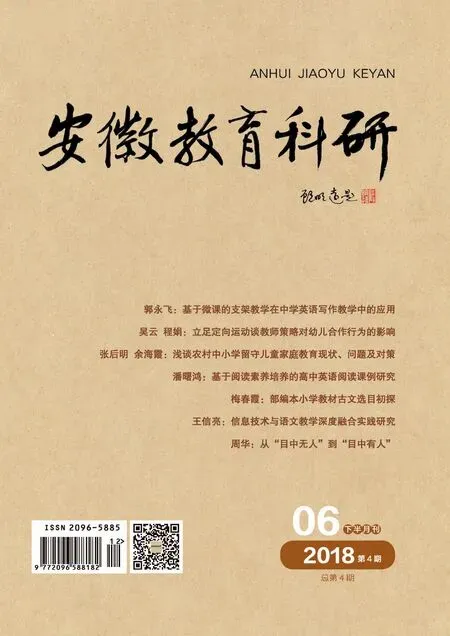基于阅读素养培养的高中英语阅读课例探究
潘曙鸿
(合肥科学岛实验中学 安徽合肥 230001)
一、引言
PISA将“阅读素养”(reading literacy)定义为“人们为了达成目标、开发潜能和参与社会,理解和运用书面文本并对其进行反馈,与之互动的能力”。“阅读素养”是对“阅读能力”概念的发展,其内涵要大于“阅读能力”。针对中国中小学生的外语阅读素养而言,它不仅包括学生学习和运用所学语言和其他知识获取信息、建构意义的能力;还包括他们通过阅读发展跨文化理解、促进多元思维、获得审美体验、形成正确价值观的积极态度和良好习惯。因此,外语阅读素养体现为“阅读能力”和“阅读品格”(王蔷、敖娜仁图雅,2015)。其中,阅读能力包括解码能力,语言知识,阅读理解和文化意识;阅读品格包括阅读习惯和阅读体验(王蔷、陈则航,2016)。
阅读素养的培养是一种建构的(constructive)和交互性的(interactive)过程,它关注的是阅读的目的和情境,将阅读与生活相联系,融入生活的各个层面,强调阅读的乐趣。以阅读者为中心是阅读素养的核心。阅读者通过阅读活动,学习语言知识,发展语言技能,与文本展开互动,通过感知与领悟、分析与比较、整合与内化,建构对语言形式、语言意义和文化内涵的新认识,提升理解和表达能力,重新认识自我与世界。阅读能力和阅读品格是相辅相成的关系,在阅读过程中,学生不仅可以提高阅读能力,而且可以养成良好的阅读习惯,形成积极的阅读体验。
二、课例探究
本文以北京师范大学版高中英语必修一Unit 3 Celebration Lesson 1 Festivals为例,从导入、读前、读中、读后等四个教学环节具体阐述如何在高中英语阅读课教学中培养学生的阅读素养。
1.教学内容分析
本文是北师大版第一模块第三单元的第一课。课文Festivals是介绍中国传统节日的说明文。从文化意识来说,本文从介绍夏、秋、冬三个季节中所对应的中国传统节日端午节、中秋节和元宵节入手,介绍中国主要节假日的庆祝方式、风俗。从语篇结构和文本内容来看,每个节日主要从时间(time),典型食物(typical food),典型活动(typical activities)和节日的意义(meaning)四个方面进行阐述,其中端午节加上了节日的由来(stories of its origin)。借助于本文的阅读,学生将获得有关端午节、中秋节以及元宵节的有关英语信息,掌握相关节日的英语词汇;借助于表格的填写,提高学生对文本信息的整理及内化能力;借助于语言信息输出有助于提高他们的阅读理解能力和表达能力;借助于对文本写作目的的追问,培养学生的评判性思维;借助于补充网页上的阅读材料扩大学生的阅读量,增加趣味性,培养愉悦的阅读体验。这些活动会加深学生对祖国传统文化的理解,增强爱国情怀,坚定文化自信,并学会用英语进行跨文化交际,传播并弘扬祖国文化。综上所述,本文的教学有助于提高学生的阅读素养。
2.学情分析
参与本课的学生为合肥市市属学校的美术艺术班高一(4)班的学生。大部分的学生语言基础较弱,但思维活跃,勇于表达。因为文章介绍的是我国的传统节日,学生已经有了母语的知识储备,可以提取信息,理解文章内容。他们了解自己国家的节日,可能会对此话题兴趣不浓,缺少阅读的动力。
3.教学目标
为了培养学生的阅读素养,提高学生的阅读兴趣和能力,教学目标设定如下。
经过本课的学习学生能够:
(1)获取并整合与端午节、中秋节以及元宵节相关的信息,包括时间,典型食物,典型活动,节日的意义和来源,借此培养他们的阅读能力(教学重点)。
(2)运用目标语言描述一个喜欢的节日(教学难点)。
(3)理解节日的意义与作用,培养他们阅读品格。
4.教学步骤
步骤一,导入环节,创设积极的阅读体验。
教师给学生展示四幅节日的图片,中秋节,教师节,国庆节,元旦,并练习英语表达方式。
T: What festivals do we have in this term?
S: Teachers’ Day, National Day, the Mid-Autumn Festival and New Year’s Day.
T: Do you like them? Why?
S: Of course. Because we have holidays and we can go home during the festivals.
T: Why do we have holidays during National Day, the Mid-Autumn Festival and New Year’s Day?
S: Because we need time to celebrate the festivals...
T: In what way do we celebrate them?
S: We go home, eat delicious food and stay with our families...
T: Do you know why we celebrate the festivals?
S1: Because we want to show our respect to teachers.
S2: In order to celebrate the foundation of our country.
S3: Because we want to get together with our families and celebrate the harvest of this year.
S4: To enjoy the happiness of the coming of the new year.
...
[设计目的]
教师通过询问本学期的节日把所学内容与学生的生活联系起来。在中国节日就意味着放假,因此这些节日是学生喜欢的。话题感强,容易引起学生的共鸣;学生代入感强,能很快进入轻松愉快的学习节日的氛围中;通过问题和图片,不仅创设合适的语境学习了目标词汇如celebrate, the Mid-Autumn Festival等,并且可以了解学生的英语语言储备情况,为接下来的课文学习做好铺垫。积极的阅读体验是培养阅读素养的必要条件。通过教师与学生之间轻松自然的交流,学生体验了愉悦的阅读氛围。
步骤二,读前环节,运用预测策略,构建信息差。
学生通过浏览图片和标题预测文本要介绍的节日。
T: How many festivals are mentioned in the text?
S: Three.
T: What are they?
S: They are the Mid-Autumn Festival, the Dragon Boat Festival and the Lantern Festival.
T: How do you know the names of the festivals in English?
S: The Mid-Autumn Festival is in autumn, the Dragon Boat Festival is related to dragon boats and the Lantern Festival is related to lanterns.
T: What information do you expect to get according to the pictures and the title?
S: It’s about the food and activities in each festival.
T: What do they have in common?
S: They are Chinese traditional festivals.
T: As Chinese, we have a good knowledge of the festivals. Why do we learn this text? Who writes the text, Chinese or a foreigner? What’s the purpose of this article? What will be talked about the festivals in the text? Are they the same as what we know about the festivals?
S: ...
[设计目的]
根据图片和标题预测文章内容,学生在提取信息前根据自己已知的知识来判断文章可能阐述的内容。预测可以帮助学生快速提取对自己有用的信息。通过教师的问题形成信息差,造成困惑和疑问,引发学生的阅读兴趣,让学生积极主动地投入阅读环节。通过预测和问题,学生明确了本课的学习目的:通过文本的学习,如何用英语语言知识介绍中国的传统节日,以传承和发扬中国的传统文化。
步骤三,读中环节,首先,运用略读策略,进行表层信息的提取与整合,培养他们阅读理解能力和文化意识。其次,运用评判性思维,比较节日文化,鉴别节日文化,培养阅读品格。
First Reading
T: Read the three parts of the text and fill in the tables.

FestivalsSeason &date/monthTypical activities or foodSpecial meaningThe Mid-Autumn FestivalThe Lantern FestivalThe Dragon Boat Festival
[设计目的]
学生通过填写表格找到facts,完成了提取信息的任务,知道了文章的内容(What a text says)。从文字到表格,运用不同格式整合信息,学生的思维得到了训练。
Second reading
T:If the purpose of this passage is to introduce the festivals in different seasons, what about the Spring Festival in spring? How do we introduce the Spring Festival to foreigners? Work in pairs, and underline expressions on when, what and why.
When
1. The Lantern Festivalfalls onthe 15thday of the firstlunar month.
2. The Dragon Boat Festivalfalls onthe 5thday of the 5thof thelunar year.
What (food)
1. It is also a day forspecial foods likemoon cakes.
2.The special foodfor the Lantern Festivalisthe sweet dumplings.
3.There is a special foodfor the festival. It iscalledzongzi.
What (activities)
1. Dragon boat raceswere organizedonlybyChinese people.
2. People from other cultures have alsotaken part inthe races...
Why (the meaning)
1.It is a special occasion forfamily.
2.It marksthe end of the Chinese New Year celebrations.
3.It marksthe beginning of the hottest season of the year.
[设计目的]
教师的问题可以激发学生在文本中找出表达节日的词、短语和句子。因为存在信息差,存在问题,学生就会有动力去解决问题。通过寻找相关表达方式并画线,让学生感知目标语言,并为后面的输出做好铺垫。
Third Reading
T:Why do we call “yuanxiaojie” the Lantern Festival instead of the Yuanxiao Festival? Do you know “Yuanxiao” is a girl’s name?
S:...
T: Have you heard the two stories about how the Lantern Festival started? Do you know other stories about how the Lantern Festival started?
搜索网站www.absolutechinatours.com,浏览网页Chinese Lantern Festival,了解元宵节起源的另外一个故事(东方朔帮助元宵姑娘跟家人团聚的故事),并欣赏欧阳修的关于元宵节的诗《生查子·元夕》,了解元宵节更多的背景知识。
[设计目的]
教师利用网络资源拓展文本的文化内涵并训练学生的批判性思维。为了培养学生的阅读素养,高中英语阅读教学要拓宽文本阅读渠道,利用一切可以阅读的媒体和资源,最大程度上兼顾阅读情境和文本格式的多样性。在教学中,精读与泛读相结合可以培养学生快速抓住有用信息的能力,泛读可以训练学生应用阅读策略的能力。文化意识是新课标中提出的英语学科素养之一。在教学中,潜移默化地培养文化意识,培养文化自信。
T: In your opinion, who writes the passage, Chinese or a foreigner? Who is the passage intended for?
S:...
浏览网页https://en.wikipedia.org/wiki/Chinese New Year,从维基百科上了解Chinese New Year 和the Spring Festival 的区别。
[设计目的]
教师用开放式的问题引导学生用评判性思维去发现、理解作者的观点、态度和意图(What underlines the text)。评判性阅读是一种深层次的阅读。评判性思维是高中生要注重培养的思维方式,对于文本内容应持有并表达出自己的观点、态度。支持、反对、赞成、质疑、欣赏都值得肯定。通过对比中国人把春节称为the Spring Festival和外国人称为Chinese New Year,了解节日文化,鉴别节日文化,培养学生的文化意识,养成良好的阅读习惯。大量的输入也为后面的输出做准备。
步骤四,读后环节,指导言语建构,输出目标语言。
Dicussion 1
T: As Chinese, how do we introduce traditional festivals properly? If you want to attract more foreigners to experience Chinese festivals, what are the foreigners most interested in ?
S: We will introduce the date, the food ,the activities, the meaning and the origin of the festivals.
S: Maybe activities of the festival are the most interesting ones for foreigners.
T: How do you know?
S: Because they can take part in the activities and enjoy the happiness of the festivals.
Let’s summarize how to introduce Chinese festivals.

SummaryWhenIt falls on...of the...lunar month/year.WhatThe special food for the festival is...Special foods like...What...be organized/ People take part in...WhyIt marks... / It’s a special occasion for...
[设计目的]
通过阅读获取信息、处理信息,并进行输出表达是高中英语阅读教学的一项重要任务。学生通过分析、整合有用的信息,巩固课中学习的目标语言。在输入足够的情况下,学生可以进行跨文化交流,增强民族自豪感,增强文化自信。让学生向外国朋友介绍中国的春节或者他们愿意介绍的传统节日,使用目标语言。引导学生以外国人的视角感知中国节日文化,培养国际意识,训练学生的思维。
Discussion 2
T:As we know, Chinese New Year is the biggest celebration around the world. Why can foreigners take part in Chinese festivals?
S:A festival is a time of joy and peace, and a time to pass on traditions.
T: Why do the people around the world celebrate festivals?
(possible answers:
We have festivals to:
Forget our work and relax ourselves for some time.
Entertain ourselves and enjoy life.
Show respect to the dead and our ancestors.
Thank the God for the harvest.
Inspire ourselves to bring hope and good luck.
Value customs and cultures.
Admire some famous people.
Love our families and friends.
[设计目的]
为了帮助学生理解,给出单词的首字母连在一起就是festival这个词。通过讨论,增强学生的文化意识,理解世界上的节日都有共同的精神内涵。人类拥有共同的文化价值观和精神财富。对中外优秀文化的理解和认同可以提高学生的跨文化意识、态度和行为取向,不仅可以增强学生的文化自信,而且可以开拓学生的国际视野。
Homework
Write a passage about a Chinese traditional festival and try to contribute to the website:www.festival.com.
[设计目的]
通过向国外的网站投稿,鼓励学生进行真实的交际。
三、结语
基于阅读素养培养的高中英语阅读教学要注重学生的主体性,尊重学生的发展特点,从学生的实际需要出发设置不同的活动,训练学生的阅读能力。要注重学生与文本的交互,学生与学生、学生与老师的多重交互。要培养学生良好的阅读习惯,教师要创设真实语境,培养学生提取有用信息和反思的能力。要培养学生的阅读品格,教师就要提倡学生泛读,如通过补充网站上的相关阅读材料,拓宽学生的视野,提高学生的阅读兴趣。总之,教师要对照阅读素养的内涵,设计阅读教学活动,落实核心素养,提升学生的阅读能力和阅读品格。

